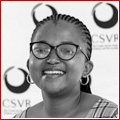The Status of Citizenship for Black Women in Post-Apartheid South Africa
Posted: 13 May, 2024 Filed under: Lesego Sekhu, Sinqobile Makhathini | Tags: African feminists, African women, apartheid, “face of poverty”, black women, discrimination, economic exploitation, heteropatriarchal systems, historical injustices, inequality, national oppression, post-colonial identity, racial division, South Africa, unemployment, women's rights Leave a comment |
Author: Lesego Sekhu Research Assistant, Centre for the Study of Violence and Reconciliation |
 |
Author: Sinqobile Makhathini Research Assistant, Centre for the Study of Violence and Reconciliation |
As we reflect on the celebration of International Women’s Month in March and motion towards the upcoming 2024 elections, which will be held on 29 May 2024, it is a significant time to critically reflect on Black women’s citizenship and positionality in post-apartheid South Africa.
Brief history
Historically, Black people have experienced second-class citizenry within the social, economic, and political landscape of South Africa. During apartheid, racial division was the primary strategy of ‘otherness’ that was exemplified by racialised citizen status that was reserved for white races, while the Black majority were systemically excluded from the imagination of the state. Equally, gender played a role in the divisions of labour, access to resources, and experiences of systematic violence that show apartheid as equal parts racial and equal parts gendered.
Beyond the ballot: AI, voter rights and the future of elections in Africa
Posted: 28 March, 2024 Filed under: Bonolo Makgale | Tags: Access to Information, AI technology, Artificial intelligence, democracy, democratic engagement, digital democracy, digital technology, digital transformation, elections, electoral fraud, Fake News, governance, inequality, information age, right to vote, socioeconomic status, technological challenge, user-friendly interfaces, voter rights, Yiaga Africa Leave a comment Author: Bonolo Makgale
Author: Bonolo Makgale
Centre for Human Rights, University of Pretoria
Introduction
The year 2024 is an extraordinary year for elections in all its hazardous glory as it sets the record for the greatest number of people living in countries that are holding elections. More voters than ever in history will be heading to the polls in at least 64 countries representing a combined population of about 49% globally. Many of these votes will test the limits of democracy, while others will be exercises in rubber-stamping and the results of which, for many, will prove consequential for years to come. Yet, these elections are taking place against the backdrop of a relentless global evolution of digital technology which has ushered in a new era of unprecedented challenges in the democratic and political space. In an era of data manipulation and the growing influence of artificial intelligence, democracy stands at a critical crossroads.
Africa is bleeding: The Anglophone crisis in Cameroon
Posted: 4 November, 2020 Filed under: Mary Izobo | Tags: #StopCameroonViolations, 24 October 2020, Anglophone crisis, autocratic, Cameroon, democracy, discrimination, economic resources, Francophones, human rights violations, inequality, Mother Francisca International Bilingual Academy Kumba, President Paul Biya, rule of law, territorial integrity Leave a comment Author: Mary Izobo
Author: Mary Izobo
International Human Rights Lawyer and Gender Advocate
Introduction
The failure to promote the rule of law and democracy creates an environment for conflict, often exacerbated by marginalisation, discrimination, inequality and inequity. The bitterness of citizens roused by violence is usually entrenched in lack of basic services and public infrastructure, corruption, lack of personal and economic security and lack of transparency and accountability of government to its citizens. Thus, the greatest problem of African countries is their failure to protect the economic, political, social, and cultural concerns of its people. This year, 2020 has been marred by a series of human rights violations from Lagos to Kumba, Africa is bleeding.
On 24 October 2020, at least eight children were killed, and dozens wounded by a group of armed men at the Mother Francisca International Bilingual Academy Kumba, in the Southwest Region of Cameroon. There has been a lot of attacks in Cameroon since 2016, however, these attacks have intensified dramatically.
Democracy in times of COVID-19: a time for introspection?
Posted: 8 April, 2020 Filed under: Eduardo Kapapelo | Tags: Angola, basic services, China, COVID-19, democracy, global pandemic, government, health systems, human rights, Hungary, inequality, Institutions, lockdown, massive corruption, militarised society, national lockdowns, pandemic, political system, politics, WHO, World Health Organization Leave a comment Author: Eduardo Kapapelo
Author: Eduardo Kapapelo
Centre for Human Rights, University of Pretoria
My father used to say ‘politics must be conducted in a country which is open, a country which has the space for deliberation and opposing views’. He added that ‘politics must be conducted in a country which is mature’. We find ourselves in challenging times, times in which the openness and maturity of our countries are being tested.
A scale we can use to test the openness and maturity of our institutions is to interrogate (i), the nature our institutions; and (ii) the quality of our institutions. In regards to their nature we can reflect on how they are structured, what they look like on paper, and how they actually function in reality. As regards quality, we can reflect on how institutions respond to stress – how they respond to the demands of the people and whether they are mature enough to understand that when individuals take to the streets in the exercise of their human rights demanding better quality of life, they are not challenging the State, but rather exercise their constitutional right to be heard.
Kidnappings in Nigeria as a class act: Implications for the criminal justice system
Posted: 18 September, 2017 Filed under: Akinola Akintayo | Tags: abductors, ‘Evans’, Chukwudubem George Onwuamadike, class act, criminal justice system, inequality, kidnapping, Nigeria, personal enrichment, ransom, targeting of the rich 2 Comments Author: Dr Akinola Akintayo
Author: Dr Akinola Akintayo
Lecturer and researcher in the Department of Public Law, Faculty of Law, University of Lagos, Nigeria
Nigeria is a country steeped in inequality. Reports indicate that a minimum of 86 of the 140 or so million Nigerians live in extreme poverty. The country’s richest individuals are also said to earn 8,000 times each day what their poor counterparts spends on basic necessaries in a year. To further underscore the severe level of inequality, studies also indicate that the combined wealth of the top five richest Nigerians can end extreme poverty in the country. That is how bad the income and wealth gap in Nigeria is.
However, this kind of inequality underpinned by exploitative and oppressive capitalist mode of production tends to weaken what some scholars have referred to as the ‘social instinct’ and breeds discontent, opposition and conflicts between society’s classes. In this kind of clime, the less privileged and deprived members of the society may well feel entitled, either within or without the law, to demand what they considered their own fair share of the commonwealth from the more opulent part of the society. The main purpose of this short piece is to interrogate emerging evidence which suggests that recent dimensions of kidnappings in Nigeria is a class act where the deprived class may be demanding what they perceived as their fair share from the more opulent class and examine the omens that this bids for the criminal justice system.
Of stereotypes and the ‘unsound mind’ clauses
Posted: 2 October, 2015 Filed under: Patricia Mwanyisa | Tags: Australian Law Reform Commission, Commonwealth Electoral Act, CRPD, disability rights, discrimination, eliminate discrimination, gender perspective, ignorance, inequality, law, mental health, mental illness, prejudice, promote equality, psychological, stereotype, stigma, tolerance, UN Convention on the Rights of Persons with Disabilities, unsound mind Leave a comment Author: Patricia Mwanyisa
Author: Patricia Mwanyisa
Human Rights, Justice and Rule of Law Programme Officer, Open Society Initiative for Southern Africa (OSISA)
Recently, during my studies I delved into the concept of stereotypes and their effects, albeit from a gender perspective. This academic encounter has become an important one to both my personal and professional frames of reference. I have discovered that my prior use and appreciation of the term stereotype was presumptuous, without depth and assumed familiarity. I had nonchalantly used the term often, in writing and conversation without fully appreciating the intricacies of this concept.
Quite worrying one might say, coming from a professional working on human rights, justice and equality issues – but I believe that my nonchalance is common among many of us. We tend to have a general over familiarisation with issues that form part of the realm in which we work and operate without necessarily appreciating the rudimentary theories underpinning particular terms or concepts.
So I think I deserve some credit for acknowledging my deficiency, and urge that we do not rush to deem as catastrophic such inadequacies in all circumstances because it is impossible to know everything about everything, even in your most familiar of territory. To be expected to know and fully understand each and every detail about a subject is a naïve expectation on the part of peers and an arrogant unintelligent assertion on the part of any such declarants. The universally renowned great mind Michelangelo, is remembered for his famous quote “ancora imparo” reportedly made at the age of 87 which means ‘I am still learning’ – well, so am I. So I ask for your indulgence as I share some of my learning on how stereotypes perpetuate inequality and marginalisation – you might just also learn that we all are still learning and need to keep learning.
I have learnt that stereotypes are a component of stigma. They assign negative attributes to socially salient differences forming what social identity theorists call in-group and out-group categorisation. People tend to stereotype as a means of screening people into either the in-group (us) or out-group (them) which in eventuality determines whether a group is accepted or rejected.
This categorisation (stereotyping) of other(s), provides people with a feeling of comfort and confidence based on what they are accustomed to, for predictability and personal security’s sake. Whilst it may be argued in some quarters that categorisation is useful in, for example, target marketing or planning of community and development projects among other mass planning purposes; unfortunately the cumulative effects of general categorisation and consequent stereotyping in most circumstances reinforce and perpetuate inequality.

 Author: Saul Leal
Author: Saul Leal